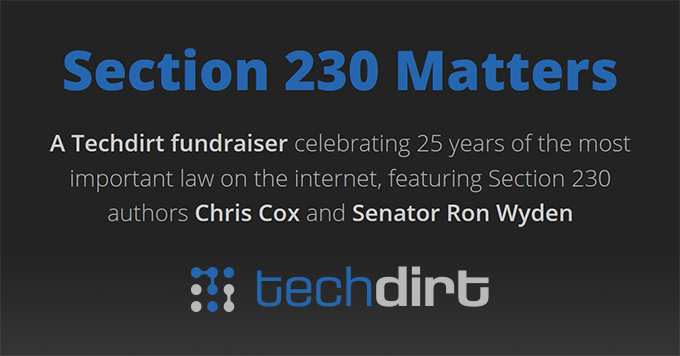from the don't-let-this-pass-you-by dept
I know that Section 230 is very much under attack these days, and I've seen so many people cheer when we point out that dumping 230 could take away (or at least, drastically alter) the sites we love and appreciate every day. I think this is because of a natural tendency of many people to focus on the negative side of things in existence, and to ignore all of the good that has resulted from them. In some ways, I think it's a variation on the famous Douglas Adams quote:
“I've come up with a set of rules that describe our reactions to technologies:
1. Anything that is in the world when you’re born is normal and ordinary and is just a natural part of the way the world works.
2. Anything that's invented between when you’re fifteen and thirty-five is new and exciting and revolutionary and you can probably get a career in it.
3. Anything invented after you're thirty-five is against the natural order of things.
As a sort of corollary to that, many people assume that the open internet is normal and ordinary and is just the natural part of the way the world works. But they feel that the way some segment of people have hijacked that open internet to do real damage in the world is against the natural order of things. For some reason, many people (incorrectly) associate Section 230 with causing that while ignoring how it also created and enabled all of the amazing good stuff that they use and love every day.
This is part of the reason we're throwing a 25th birthday party for Section 230, which you can read about at 230Matters.com.
But it's also important to state directly how many amazing things 230 has enabled, so that people realize we shouldn't throw out the good in response to misuse. Professor Eric Goldman has a wonderful blog post detailing how Section 230 has made his life better. Here's just a snippet of a very long list:
- I love that my wife can find and connect online with other people across the globe who share her rare lung cancer mutation, ROS1. I estimate about 6,000 Americans are diagnosed with the ROS1 mutation every year–such a small number that it’s unlikely that any geographic region will have more than a handful of ROS1ders. That makes the formation of geography-dependent ROS1 communities functionally impossible. (The small population size also means that the mainstream media rarely talks about ROS1 specifically). But online, the patient community can accomplish amazing things, like the creation of a global clinical trial that has dramatically expanded the amount of ROS1 biopsied material available to researchers.
- I love being able to hear good news about my friends and their families. In the old days, such news often would wait until annual holiday cards, and that made it harder for us to celebrate each other.
- I love how social media lets us maintain friendships and professional connections with people from prior jobs or schools. In the past, those connections would fade once the physical proximity ended and we moved into new circles. Now, we can maintain life-long connections through ongoing social media engagement.
- I love using GIFs and memes to express myself. Especially ones referencing Star Wars and Star Trek
The list goes on from there. It is honestly difficult to overstate how important Section 230 is to everything that we do today. So many of the services I use and rely on every day are able to exist and focus on providing better and better services to users (rather than throwing it all away on lawyers) thanks to 230. I stay in touch with my family, friends and colleagues using Twitter, Facebook, Zoom, WhatsApp, Hangouts, Element, Skype, Slack, Discord & Signal and much much more. In just the last year or so I've been building some really cool (non-work related) projects using Notion and Airtable. Without a Section230 I'm not sure how either company exists in a similar form. For following the news, I use Twitter, Reddit, Nuzzel and others. We've moved from a world in which everyone had to buy Microsoft Office in order to do basic job functions, to being able to rely on tools like Google Docs. Asana, Trello, Notion and others are key project management tools. For coders, Github and StackOverflow are as important as breathing. For entertainment these days, YouTube, Twitch, Soundcloud and various podcast hosts are indispensable. Craigslist & Freecycle have helped me get rid of old stuff and to refurnish my house at the same time. Wikipedia remains the most amazing reference work ever built.
All of these services are protected and helped by Section 230. Without it, some might still exist -- but most would have a radically different form, with less openness, less information, and fewer important services. Many would likely have never gotten off the ground, or would have been smothered in their infancy.
Yes, there are some bad things and bad people online. And yes, some companies don't necessarily handle content moderation duties in ways that you or I might if we were in charge. But the wealth of amazing services, opportunities, and content made available to us by the open web is so amazing, and we shouldn't take it for granted. Even more importantly, we shouldn't throw it all away because some people abuse these offerings.
Filed Under: 230 matters, free speech, internet, section 230


